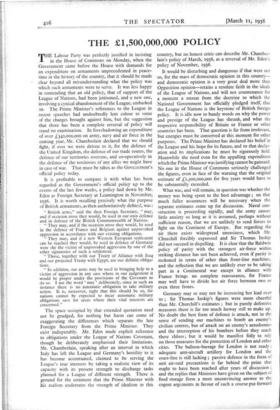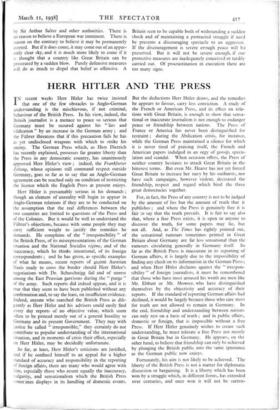THE £1,500,000,000 POLICY
THE Labour Party was perfectly justified in insisting in the House of Commons on Monday, when the Government came before the House with demands for an expenditure on armaments unprecedented in peace- time in the history of the country, that it should be made clear beyond all misunderstanding what the policy was which such armaments were to serve. It was less happy in contending that an old policy, that of support of the League of Nations, had been jettisoned, and a new one, involving a cynical abandonment of the League, embarked on. The Prime Minister's references to the League in recent speeches had undoubtedly lent colour to some of the charges brought against him, but the suggestion that there has been a complete reversal of policy will stand no examination. In foreshadowing an expenditure of over Z340,000,000 on army, navy and air force in the coming year, Mr. Chamberlain declared that we should fight, if ever we were driven to it, for the defence of the United Kingdom, the defence of our trade routes, the defence of our territories overseas, and co-operatively in the defence of the territories of any allies we might have in case of war. That must be taken as the Government's official policy today.
It is profitable to compare it with what has been regarded as the Government's official policy up to the events of the last few weeks, a policy laid down by Mr. Eden as Foreign Secretary at Leamington in November, 1936. It is worth recalling precisely what the purpose of British armaments, as then authoritatively defined, was : " British arms," said the then Foreign Secretary•, " may, and if occasion arose they would, be used in our own defence and in defence of the British Commonwealth of Nations.
" They may, and if the occasion arose they would, be used in the defence of France and Belgium against unprovoked aggression in accordance with our existing obligations.
" They may, and if a new Western European settlement can be reached they would, be used in defence of Germany were she the victim of unprovoked aggression by one of the other signatories of such a settlement.
" Those, together with our Treaty of Alliance with Iraq and our projected Treaty with Egypt, are our definite obliga- tions.
" In addition, our arms may be used in bringing help to a victim of aggression in any case where in our judgement it would be proper under the provisions of the Covenant to do so. I use the word ' may ' deliberately, since in such an instance there is no automatic obligation to take military action. It is, moreover, right that this should be so, for nations cannot be expected to incur automatic military obligations save for areas where their vital interests are concerned."
The space occupied by that extended quotation need not be grudged, for nothing but harm can come of exaggerating the differences which separate the late Foreign Secretary from the Prime Minister. They exist indisputably. Mr. Eden made explicit reference to obligations under the League of Nations Covenant, though he deliberately emphasised their limitations.
Mr. Chamberlain, speaking after an interval in which Italy has left the League and Germany's hostility to it has become accentuated, claimed to be serving the League's true interests by taking a realistic view of its capacity with its present strength to discharge tasks planned for a League of different strength. There is ground for the comment that the Prime Minister with his realism underrates the strength of idealism in this country, but no honest critic can describe Mr. Chamber- lain's policy of March, 1938, as a reversal of Mr. Eden's policy of November, 1936.
It would be disturbing and dangerous if that were not so, for the mass of democratic opinion in this country— and democratic opinion is a very great deal more than Opposition opinion—retains a resolute faith in the ideals of the League of Nations, and will not countenance for a moment a retreat from the doctrine to which the National Government has officially pledged itself, that the League of Nations is the keystone of British foreign policy. It is idle now to bandy words on why the power and prestige of the League has shrunk, and what the respective responsibility of Britain or France or other countries has been. That question is far from irrelevant, but energies must be conserved at this moment for other purposes. The Prime Minister has declared his belief in the League and his hope for its future, and to that declar- ation and its implications he must be rigorously held. Meanwhile the need even for the appalling expenditure which the Prime Minister was justifying cannot be gainsaid. No one in the House of Commons seriously challenged the figures, even in face of the warning that the original estimate of £1,500,000,000 for five years would have to be substantially exceeded.
What was, and will remain, in question was whether the money was being spent to the best advantage ; on that much fuller assurances will be necessary when the separate estimates come up for discussion. Naval con- struction is proceeding rapidly, and the army causes little anxiety so long as it is assumed, perhaps without sufficient reason, that we are unlikely to send forces to fight on the Continent of Europe. But regarding the air there exists widespread uneasiness, which Mr. Churchill forcibly expressed and Sir Thomas Inskip did not succeed in dispelling. It is clear that the Baldwin policy of parity with the strongest air-force within striking distance has not been achieved, even if parity is reckoned in terms of other than front-line machines, and the reflection that we are unlikely ever to be taking part in a Continental war except in alliance with France brings no complete reassurance, for France may well have to divide her air force between two or even three fronts.
Germany may or may not be increasing her lead over us ; Sir Thomas Inskip's figures were more cheerful than Mr. Churchill's estimates ; but in purely defensive measures there is far too much leeway still to make up. No doubt the best form of defence is attack, not in the sense of sending our machines to bomb an enemy's civilian centres, but of attack on an enemy's aerodromes and the interception of his bombers before they reach these shares ; but it would be manifest folly to rely on those measures for the protection of London and other cities. The balloon-barrage for London is not ready ; adequate anti-aircraft artillery for London and the coast-line is still lacking ; passive defence in the form of anti air-raid precautions is far behind the point that ought to have been reached after years of discussion ; and the replies that Ministers have given on the subject of food storage form a most unconvincing answer to the cogent arguments in favour of such a course put forward by Sir Arthur Salter and other authorities. There is no reason to believe a European war imminent. There is reason on the contrary to believe it may be permanently averted. But if it does come, it may come out of an appar- ently clear sky, and it is much more likely to come if it is thought that a country like Great Britain can be prostrated by a sudden blow. Purely defensive measures will do as much to dispel that belief as offensive. A Britain seen to be capable both of withstanding a sudden shock and of maintaining a protracted struggle if need be presents a discouraging spectacle to an aggressor. If the discouragement is severe enough peace will b e preserved. But it will not be severe enough, if our protective measures are inadequately conceived or tardily carried out. Of procrastination in execution there are too many signs.











































 Previous page
Previous page